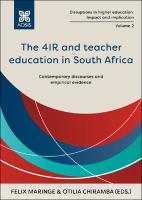The 4IR and teacher education in South Africa:
contemporary discourses and empirical evidence
Author(s)
KRISHNANNAIR, ANILKUMAR
Krishnannair, Syamala
Olivier, Jako
Tsakeni, Maria
Babane, Vusiwana Constance
Kadenge, Emure
Luckay, Melanie Bernadette
MUTEKWE, EDMORE
Naidoo, Jayaluxmi
Singh- Pillay, Asheena
Molotsi, Abueng R.
Contributor(s)
Maringe, Felix (editor)
Chiramba, Otilia Fortunate (editor)
Language
EnglishAbstract
The 4IR has become an overarching framework within which education systems, including teacher education, are operating. Contingent upon the ideology of neo-liberalism, the 4IR seeks to transform societies in ways which respond to the relentless developments in technology, the Internet and digital capacities which, by design and intent, are purposed at increasing both productivity and the associated quality while at the same time reducing human intervention in the same processes. In teacher education, how we teach and train student teachers will be substantially influenced by the imperatives of the 4IR. There are multiple unresolved questions as the 4IR takes centre stage. For example, what will it mean for teaching and learning in schools that have severe technological and digital deficits; for teachers and students who have minimal technological literacies; for delivering high-quality teaching and learning; for transforming both the content and pedagogies of teacher education and, above all, for delivering socially just educational experiences for all our learners, regardless of class, race, and privilege. The discourse of the 4IR is contemporary and requires multiple perspectives to explore what it means in different contexts and settings, the understandings it engenders in people, what it implies across a wide range of educational decision-making levels, and that its fundamental assumptions cohere with national and societal assumptions about equality, equity and social justice. Multiple methodological approaches were utilised in the interrogation of the idea of the 4IR in teacher education in South Africa, including theoretical, empirical, and small-scale case studies, amongst others. The data these approaches provide are equally valued based on the purposes for which they have been derived.
Keywords
4IR; educationDOI
10.4102/aosis.2022.BK306ISBN
9781776342181, 9781776342198, 9781776342204Publisher
AOSISPublisher website
https://books.aosis.co.za/index.php/obPublication date and place
2022Series
Disruptions in higher education: Impact and implication, 2Classification
Education


 Download
Download